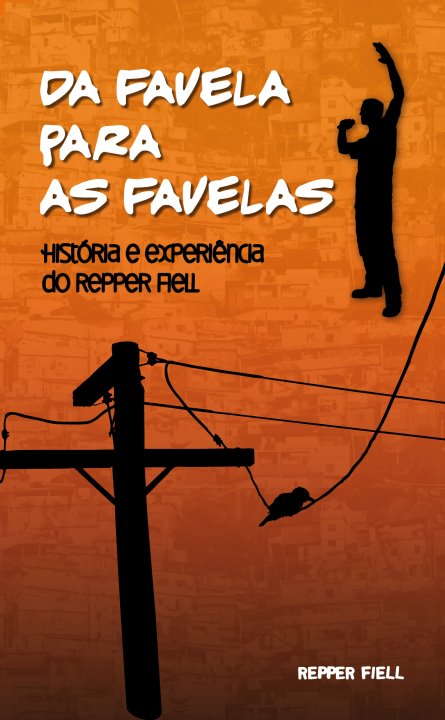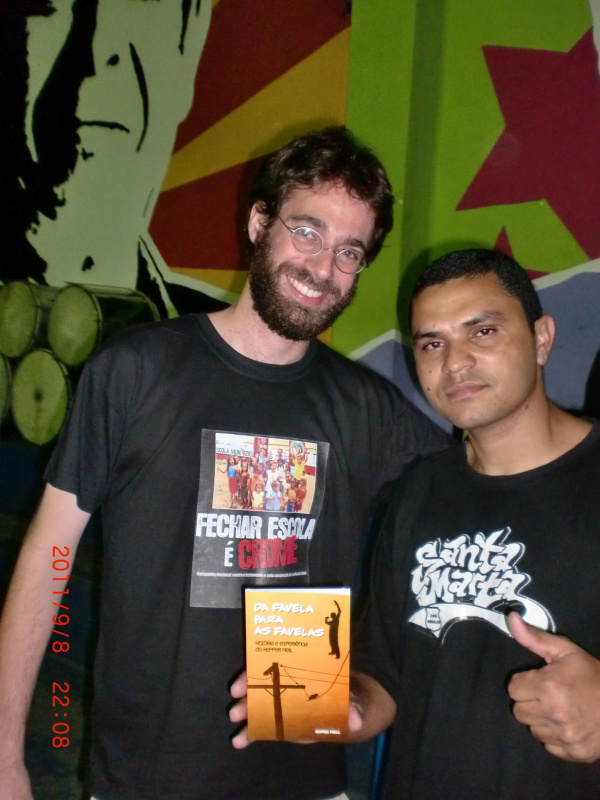Da Favela para as Favelas (book): mudanças entre as edições
(Criou página com ' thumb|center|600px|Capa fiell.jpg = O Livro = O livro ''Da favela para as favelas'', lançado em 2011, conta a história e as experiências do...') |
Sem resumo de edição |
||
| Linha 2: | Linha 2: | ||
[[File:Capa fiell.jpg|thumb|center|600px|Capa fiell.jpg]] | [[File:Capa fiell.jpg|thumb|center|600px|Capa fiell.jpg]] | ||
The book: | |||
The book Da favela para as favelas [From the Favela to Favelas], published in 2011, tells the story and experiences of rapper Fiell, a resident of Morro Santa Marta, a favela located in a hill in the neighborhood of Botafogo, South Zone of Rio de Janeiro. Besides talking about his life and what he learned inside and outside the hip-hop world, Fiell wants his ideas to contribute to all those who have a commitment to changing the world. This book talks about the favela, human rights, capitalist propaganda, the transforming function of art, communal communication, Pacifying Police Unity (UPP), among other topics. “I am aware that we still don’t have the habit of reading daily and that TV gets our attention more than books after an exhausting day´s work. However, for this moment of repression and oppression that over 70% of the urban population in our country isliving , reading is essential in order to form critical minds” says the author in the introduction of the book, which is dedicated to all workers, young people, and residents of the favelas and peripheral areas of Brazil. | |||
Article about the book on the NPC’s (Piratininga’s Communication Center) website:https://nucleopiratininga.org.br/da-favela-para-as-favelas-pequeno-grande-livro-do-repper-fiell-do-santa-marta/. | |||
= From Favela to Favelas, for real = | |||
By Alan Freihof Tygel, taken from: | |||
http://cirandas.net/alantygel/blogdoalan/da-favela-para-as-favelas-de-verdade | |||
I met Fiell on May 22nd, 2010, at the IML. For those who don’t know, IML stands for Instituto Médico Legal, and is the forensic medicine facility in Brazil responsible for veryfing corpses for their cause of death. It is also where the forensic examination is held to legally certify whether someone has been assaulted. | |||
On the same day, a Saturday, I attended the class of the communal communication course of NPC (Piratininga Communication Center). A debate was scheduled over the Pacifying Police Unity (UPP), conducted by a resident of the pacified favela. This resident had written a booklet on police approaches motivated by increasing abuse perpetrated by pacifying police forces in Santa Marta favela. | |||
After about an hour of delay, the course coordinator, Claudia Santiago, came with news: “Fiell cannot come today because he was assaulted and arrested by the Pacifying Police Unit (UPP) last night.” What a coincidence, isn’t it? The guest lecturer to debate the issue of UPP cannot come because he was assaulted and arrested by the UPP itself. | |||
Nevertheless, Fiell left the police station by the morning, took a shower and went to the course. He was hurt, very bruised and limping when he arrived. He told us what had happened (read the book, everything’s in there) and participated in the afternoon activities. By the end of the day, few people remained. | |||
We convinced Fiell that he should go to the IML to have his body examined and then prosecute the police officers who had assaulted him. I had my car so I decided to take him there. | |||
We waited for about two hours to be called inside for the examination. Men dressed as butchers, in white plastic boots, passed by all the time. If I remember it well, it was the first time I had a deep conversation with a favela resident. | |||
After the examination, which attested he had suffered aggression, Fiell invited me to have a beer in Santa Marta. If I remember it well, it was also the first time I entered a favela. | |||
In the present day, one year and a half - and a lot of beers in Zé Baixinho (a bar in the favela) - later, I already feel at home in Santa Marta. I have had the opportunity to closely monitor the birth, construction and violent closure of Santa Marta Radio. The musical partnership with Fiell, the reggae shows and the work on the project “Rio Economia Solidária” (Rio Solidarity Economy) made Santa Marta my second home. | |||
[[File:Alanefiell.jpg|thumb|center|600px|Alan e Fiell]] | [[File:Alanefiell.jpg|thumb|center|600px|Alan e Fiell]] | ||
''' | '''Clear, objective and always provocative language: what about you?''' | ||
For all this - for this one year and a half following Fiell in lectures, shows, debates - I thought I would not be surprises reading the book. I thought everything written there would sound very familiar. | |||
Obviously, I was pleasantly surprised. The book is simply brilliant. Its objectivity and clarity make the title, which may seem commonplace - From Favela to Favelas - an absolute truth. | |||
The book is divided into thematic chapters that address the favela, communication, education, rights, the hip-hop movement, drug trafficking, the UPP, work, and citizenship. In each one of them, a little bit of Fiell’s story is told, under the light of the theme. | |||
From a consumerist singer to a freestyle rapper, Fiell tells ,in a delicate way - and no less provocative because of that- his process of politicisation and de-alienation. This transformation cost him some jobs for warning his colleagues about the exploitation they were suffering: “He handed me my money arguing that I could no longer work with him, that I was too intelligent and I should just rap.” | |||
By realizing that his condition of poverty was not his fault, as he used to believe, Fiell decides to revolutionize his life and fight for a fairer society for all. He discovered in popular communication - with newspaper, radio and now the book - a very effective way to do so. | |||
Fiell | Fiell said the book was to be read on the bus, on the way back from work. That is exactly what I did: its small format and simple and straightforward language made me gobble down 81 pages in one hour of traffic on 485 (a bus line in the city of Rio). At a certain moment, the light above my seat burned out. The bus was empty so I could change seats to continue reading. | ||
If I had to define the book in one single word, no doubt: provocative. The book is filled with provocations from beginning to end. “Is there a democracy in Brazil? Who is this for?”; “I use rap to revolutionize the working people’s mind in the peripheral areas of Brazil. What about you?”; “Let’s organize ourselves because the removals will come and all our history will become one more book for sociologists and researchers who do not live in the favelas.” | |||
Fiell | Fiell opens wide the contradictions of those who claim to be from the people but at the first opportunity make TVannouncements and escape the favela. The image issue is also addressed in quite a direct way. “We know that to have a Nike, that the media forces us to have through daily advertisements, several young, black and white people from favelas and peripheral areas of our Brazil kill and die.” | ||
And here’s more provocation: in this context, how responsible is a famous rapper who wears Nike? | |||
At last, one question remained in my head, which I put in the form of a provocation to all of us: how can we effectively make this book reach the hands of workers who take crowded buses, arrive home tired and only have strength to turn on the TV and sleep to bear the next day? | |||
By describing his routine before moving to Santa Marta, Fiell said he would leave home at 4:30 a.m. and buy the Extra or Meia Hora newspapers (famous tabloids in Rio), to see the news about violences and the butts. If he left late, there would be no newspaper. | |||
If there is any book able to compete with these tabloids, that workers can read and reflect upon on their way back home, this book is Da Favela para as Favelas - History and Experience of Rapper Fiell. | |||
It is our duty to spread it. | |||
The book can be purchased in Antonio Gramsci Bookshop, Alcindo Guanabara Street, 17, ground floor, Downtown Rio de Janeiro. Contact: 2220-4623 or via website:http://www.educarliberdade.com.br/fiell.html | |||
| | ||
Edição das 12h15min de 14 de dezembro de 2021
The book: The book Da favela para as favelas [From the Favela to Favelas], published in 2011, tells the story and experiences of rapper Fiell, a resident of Morro Santa Marta, a favela located in a hill in the neighborhood of Botafogo, South Zone of Rio de Janeiro. Besides talking about his life and what he learned inside and outside the hip-hop world, Fiell wants his ideas to contribute to all those who have a commitment to changing the world. This book talks about the favela, human rights, capitalist propaganda, the transforming function of art, communal communication, Pacifying Police Unity (UPP), among other topics. “I am aware that we still don’t have the habit of reading daily and that TV gets our attention more than books after an exhausting day´s work. However, for this moment of repression and oppression that over 70% of the urban population in our country isliving , reading is essential in order to form critical minds” says the author in the introduction of the book, which is dedicated to all workers, young people, and residents of the favelas and peripheral areas of Brazil.
Article about the book on the NPC’s (Piratininga’s Communication Center) website:https://nucleopiratininga.org.br/da-favela-para-as-favelas-pequeno-grande-livro-do-repper-fiell-do-santa-marta/.
From Favela to Favelas, for real
By Alan Freihof Tygel, taken from: http://cirandas.net/alantygel/blogdoalan/da-favela-para-as-favelas-de-verdade I met Fiell on May 22nd, 2010, at the IML. For those who don’t know, IML stands for Instituto Médico Legal, and is the forensic medicine facility in Brazil responsible for veryfing corpses for their cause of death. It is also where the forensic examination is held to legally certify whether someone has been assaulted.
On the same day, a Saturday, I attended the class of the communal communication course of NPC (Piratininga Communication Center). A debate was scheduled over the Pacifying Police Unity (UPP), conducted by a resident of the pacified favela. This resident had written a booklet on police approaches motivated by increasing abuse perpetrated by pacifying police forces in Santa Marta favela.
After about an hour of delay, the course coordinator, Claudia Santiago, came with news: “Fiell cannot come today because he was assaulted and arrested by the Pacifying Police Unit (UPP) last night.” What a coincidence, isn’t it? The guest lecturer to debate the issue of UPP cannot come because he was assaulted and arrested by the UPP itself.
Nevertheless, Fiell left the police station by the morning, took a shower and went to the course. He was hurt, very bruised and limping when he arrived. He told us what had happened (read the book, everything’s in there) and participated in the afternoon activities. By the end of the day, few people remained.
We convinced Fiell that he should go to the IML to have his body examined and then prosecute the police officers who had assaulted him. I had my car so I decided to take him there.
We waited for about two hours to be called inside for the examination. Men dressed as butchers, in white plastic boots, passed by all the time. If I remember it well, it was the first time I had a deep conversation with a favela resident.
After the examination, which attested he had suffered aggression, Fiell invited me to have a beer in Santa Marta. If I remember it well, it was also the first time I entered a favela.
In the present day, one year and a half - and a lot of beers in Zé Baixinho (a bar in the favela) - later, I already feel at home in Santa Marta. I have had the opportunity to closely monitor the birth, construction and violent closure of Santa Marta Radio. The musical partnership with Fiell, the reggae shows and the work on the project “Rio Economia Solidária” (Rio Solidarity Economy) made Santa Marta my second home.
Clear, objective and always provocative language: what about you?
For all this - for this one year and a half following Fiell in lectures, shows, debates - I thought I would not be surprises reading the book. I thought everything written there would sound very familiar.
Obviously, I was pleasantly surprised. The book is simply brilliant. Its objectivity and clarity make the title, which may seem commonplace - From Favela to Favelas - an absolute truth.
The book is divided into thematic chapters that address the favela, communication, education, rights, the hip-hop movement, drug trafficking, the UPP, work, and citizenship. In each one of them, a little bit of Fiell’s story is told, under the light of the theme.
From a consumerist singer to a freestyle rapper, Fiell tells ,in a delicate way - and no less provocative because of that- his process of politicisation and de-alienation. This transformation cost him some jobs for warning his colleagues about the exploitation they were suffering: “He handed me my money arguing that I could no longer work with him, that I was too intelligent and I should just rap.”
By realizing that his condition of poverty was not his fault, as he used to believe, Fiell decides to revolutionize his life and fight for a fairer society for all. He discovered in popular communication - with newspaper, radio and now the book - a very effective way to do so.
Fiell said the book was to be read on the bus, on the way back from work. That is exactly what I did: its small format and simple and straightforward language made me gobble down 81 pages in one hour of traffic on 485 (a bus line in the city of Rio). At a certain moment, the light above my seat burned out. The bus was empty so I could change seats to continue reading.
If I had to define the book in one single word, no doubt: provocative. The book is filled with provocations from beginning to end. “Is there a democracy in Brazil? Who is this for?”; “I use rap to revolutionize the working people’s mind in the peripheral areas of Brazil. What about you?”; “Let’s organize ourselves because the removals will come and all our history will become one more book for sociologists and researchers who do not live in the favelas.”
Fiell opens wide the contradictions of those who claim to be from the people but at the first opportunity make TVannouncements and escape the favela. The image issue is also addressed in quite a direct way. “We know that to have a Nike, that the media forces us to have through daily advertisements, several young, black and white people from favelas and peripheral areas of our Brazil kill and die.”
And here’s more provocation: in this context, how responsible is a famous rapper who wears Nike?
At last, one question remained in my head, which I put in the form of a provocation to all of us: how can we effectively make this book reach the hands of workers who take crowded buses, arrive home tired and only have strength to turn on the TV and sleep to bear the next day?
By describing his routine before moving to Santa Marta, Fiell said he would leave home at 4:30 a.m. and buy the Extra or Meia Hora newspapers (famous tabloids in Rio), to see the news about violences and the butts. If he left late, there would be no newspaper.
If there is any book able to compete with these tabloids, that workers can read and reflect upon on their way back home, this book is Da Favela para as Favelas - History and Experience of Rapper Fiell.
It is our duty to spread it.
The book can be purchased in Antonio Gramsci Bookshop, Alcindo Guanabara Street, 17, ground floor, Downtown Rio de Janeiro. Contact: 2220-4623 or via website:http://www.educarliberdade.com.br/fiell.html


